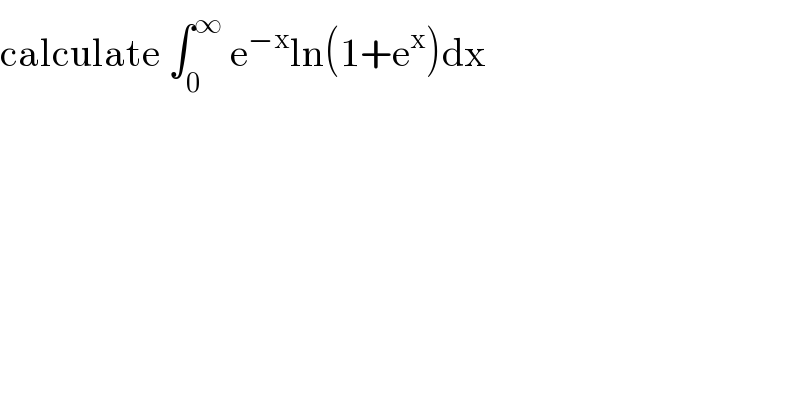
Question and Answers Forum
Question Number 102417 by mathmax by abdo last updated on 09/Jul/20

Answered by floor(10²Eta[1]) last updated on 09/Jul/20
![u=ln(e^x +1)⇒du=(e^x /(e^x +1))dx dv=e^(−x) dx⇒v=−e^(−x) [−e^(−x) ln(e^x +1)]_0 ^∞ +∫_0 ^∞ (1/(e^x +1))dx ln(2)+∫_0 ^∞ (1/(e^x +1))dx=I u=e^x ⇒(du/u)=dx ∫_1 ^∞ (1/(u(u+1)))du=∫_1 ^∞ ((1/u)−(1/(u+1)))du lim_(a→∞) [ln(u)−ln(u+1)]_1 ^a =ln(2)) ⇒I=ln(2)+ln(2)=ln(4).](Q102426.png)
Commented by mathmax by abdo last updated on 10/Jul/20

Answered by OlafThorendsen last updated on 09/Jul/20
![I = ∫_0 ^∞ e^(−x) ln(1+e^x )dx I = ∫_0 ^∞ e^(−x) ln[e^x (1+e^(−x) )]dx I = ∫_0 ^∞ [xe^(−x) +e^(−x) ln(1+e^(−x) )]dx I = [−(x+1)e^(−x) +(1+e^(−x) )(1−ln(1+e^(−x) ))]_0 ^(+∞) I = (0+1)−(−1+2(1−ln2)) I = 2ln2](Q102428.png)
Answered by mathmax by abdo last updated on 10/Jul/20
![I =∫_0 ^∞ e^(−x) ln(1+e^x )dx by parts u^′ =e^(−x) and v =ln(1+e^x ) I =[−e^(−x) ln(1+e^x )]_0 ^∞ +∫_0 ^∞ e^(−x) ×(e^x /(1+e^x ))dx =ln(2)+∫_0 ^∞ (dx/(1+e^x )) 4hangement e^x =t give ∫_0 ^∞ (dx/(1+e^x )) = ∫_1 ^(+∞ ) (dt/(t(1+t))) =∫_1 ^(+∞) ((1/t)−(1/(t+1)))dt =[ln∣(t/(t+1))∣]_1 ^(+∞) =−ln((1/2)) =ln(2) ⇒ I =2ln(2)](Q102695.png)
